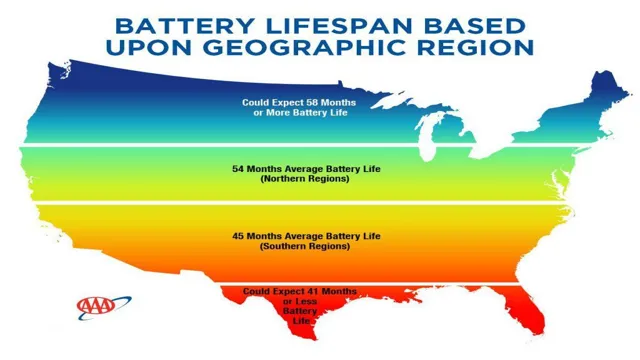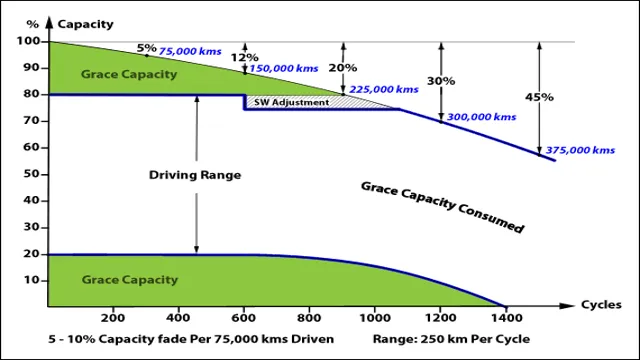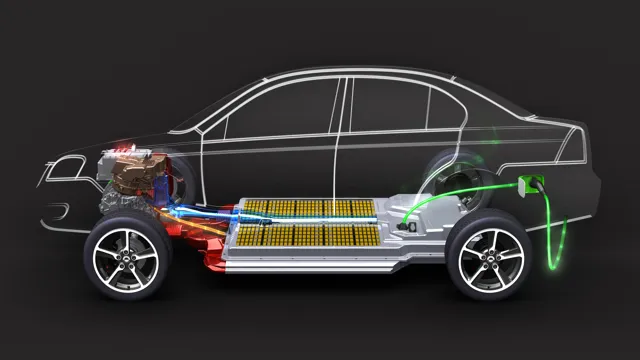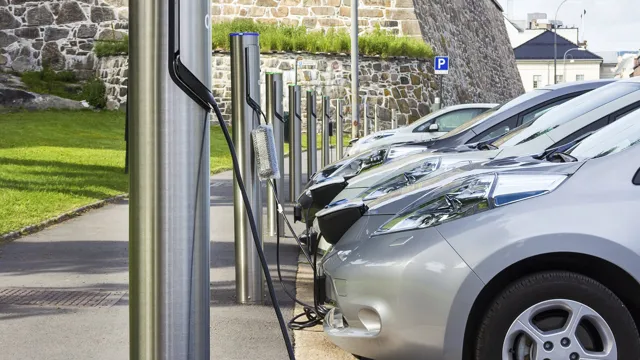The Shocking Truth: Exploring the Average Lifespan of an Electric Car Battery
Have you ever wondered about the lifespan of electric car batteries? With the rise in popularity of electric vehicles, this question has become more and more relevant. While traditionally, car batteries would only last a few years before needing to be replaced, electric car batteries are designed to have a much longer lifespan. But what exactly does that mean? How long will an electric car battery last before needing to be replaced? In this blog post, we’ll dive into the specifics of electric car battery lifespan, giving you a better understanding of what to expect from your own electric vehicle.
Introduction
One of the most common questions that people ask when considering buying an electric car is about the average lifespan of an electric car battery. While it’s difficult to give an exact answer, the average lifespan of an electric car battery is generally around 8-10 years or 100,000 to 200,000 miles. However, this can vary depending on a number of factors such as the type of battery, the brand of the car, and how well the battery is maintained.
Some electric cars have batteries that are designed to last longer than others, and some car manufacturers offer warranties that cover the battery for a certain period of time. It’s also important to note that the lifespan of an electric car battery can be extended with proper maintenance, such as keeping the battery charged between 20% and 80%, avoiding exposure to extreme temperatures, and using regenerative braking. Overall, electric car batteries are designed to last a long time and are a reliable and cost-effective option for environmentally-conscious drivers.
Defining Battery Lifespan
Battery lifespan is a crucial factor in determining the longevity and performance of a battery. It refers to the amount of time a battery can retain its ability to hold a charge and perform at its optimal level. The lifespan of a battery depends on various factors such as usage patterns, charging habits, temperature, and the type of battery.
For instance, lithium-ion batteries used in smartphones have a lifespan of about 2-3 years before their capacity starts deteriorating, while lead-acid batteries used in cars can last up to 5 years or more with proper maintenance. It’s important to understand the lifespan of your battery and take appropriate measures to extend it, which can save you money and improve the longevity of your device.

Factors Affecting Battery Lifespan
Battery lifespan is an important factor that needs to be considered when using any device that runs on battery power. The lifespan of a battery depends on several factors, including the type of battery, its usage, and the environment in which it is used. In this blog section, we will discuss the various factors that affect battery lifespan in detail.
We will also provide tips on how to extend battery life for different types of batteries. So, if you want to know how to get the most out of your battery-powered devices, read on.
Average Lifespan of Electric Car Batteries
Electric cars have become increasingly popular in recent years, and as a result, many people are curious about the average lifespan of an electric car battery. While the lifespan of an electric car battery can vary depending on a variety of factors, such as its age, condition, and how frequently it is charged, most electric car batteries are designed to last for around 100,000 miles before needing to be replaced. However, some electric car batteries have been known to last much longer than this, with some even surpassing 200,000 miles before needing to be replaced.
Additionally, the lifespan of an electric car battery can be extended through proper maintenance, such as regular charging and ensuring that the battery is kept at the correct temperature. Overall, while the average lifespan of an electric car battery is around 100,000 miles, the lifespan can be extended through proper care and maintenance.
Research Findings
Electric car batteries are a crucial component of electric vehicles and are a key factor in the decision-making process for many potential buyers. A recent study conducted by the US Department of Energy’s National Renewable Energy Laboratory has found that on average, electric car batteries have a lifespan of about 8 to 10 years. However, this lifespan can be impacted by several factors, including temperature, charging frequency, and overall usage.
While some batteries have lasted up to 15 years, others have needed replacement after just a few years. It’s essential to keep in mind that the lifespan of an electric car battery is heavily dependent on its use and upkeep. Proper maintenance and usage can help extend the life of the battery, ultimately saving money in the long run.
With ongoing research and advancements in technology, we can expect to see longer-lasting electric car batteries in the future, making electric cars even more practical and cost-effective for everyday use.
Comparative Analysis by Model and Manufacturer
Comparative Analysis, Average Lifespan, Electric Car Batteries As electric cars continue to grow in popularity, one important factor that potential buyers consider is the lifespan of the battery. After all, the battery is one of the most expensive components of an electric car and replacing it can be a costly affair. A comparative analysis of electric car batteries by model and manufacturer reveals that the average lifespan of these batteries is approximately 8-10 years or 100,000 miles.
However, this can vary greatly depending on the manufacturer, model and how the car is driven and maintained. For example, Tesla’s batteries are known to have a longer lifespan than those of other manufacturers, with some reports suggesting that they can last up to 500,000 miles in ideal conditions. Similarly, some models from Nissan and Chevrolet have seen a decrease in battery life over time, while models from Kia and Hyundai have maintained their battery life well.
Ultimately, the average lifespan of electric car batteries will depend on a variety of factors, but it’s clear that some manufacturers and models are better than others in terms of battery longevity.
Real-World Experiences from Electric Car Owners
Electric car owners often wonder about the average lifespan of electric car batteries. While there is no concrete answer, studies have shown that most batteries last between 8 to 10 years before needing to be replaced. Of course, this can vary depending on the make and model of the car, how often it is charged, and the overall maintenance of the battery.
It’s important to note that even when a battery’s capacity reaches 70%, it can still be used for many more years. Not to mention, advancements in technology are making electric car batteries more efficient and longer-lasting than ever before. Electric car owners can take comfort in knowing that their batteries will last them for years to come and that there are options for recycling or repurposing the batteries once they are no longer functional in the car.
Maximizing Battery Lifespan
As electric cars become more popular, many people are curious about the average lifespan of an electric car battery. While it can vary based on a variety of factors such as driving habits and temperature, the average lifespan of a lithium-ion battery, which is commonly used in electric cars, is around 8 to 10 years or 100,000 to 200,000 miles. However, there are steps you can take to maximize your electric car battery’s lifespan.
For example, keeping your battery’s state of charge between 20% and 80% can help prevent damaging it. Additionally, avoiding extreme temperatures and heavy acceleration and braking can also extend your battery’s lifespan. Just like any other type of vehicle, proper maintenance is key to ensuring your electric car battery lasts as long as possible.
Best Practices for Charging and Discharging
Maximizing battery lifespan is essential to ensure the longevity and performance of your electronic devices. One of the best practices for achieving this is to avoid overcharging by disconnecting the battery once it reaches 100%. This will prevent the battery from overheating and expanding, which can ultimately reduce its lifespan.
On the other hand, it’s also important not to let your battery drain completely before recharging it. Low battery levels can cause irreversible chemical reactions, leading to a permanent loss of capacity. Instead, aim to keep your battery charge levels between 40 and 80 percent whenever possible.
Additionally, avoid exposing your device to extreme temperatures and always use the appropriate charger for the battery. By implementing these simple tips, you can increase the life of your battery and enjoy consistent device performance longer.
Regular Maintenance Tips
When it comes to maximizing the lifespan of your battery, regular maintenance is essential. One straightforward tip to keep your battery running longer is to avoid charging it to its maximum potential. Fully charging your battery can increase its temperature, which can ultimately shorten its lifespan.
Instead, try to maintain a consistent charging pattern by charging your battery to around 80% and then letting it discharge to at least 20% before recharging it. Another handy tip is to keep your battery cool. Batteries tend to degrade faster when exposed to high temperatures, so try to keep your device in a well-ventilated area to prevent it from overheating.
Lastly, try to avoid using your device while it’s charging, as this can generate excess heat, which can lead to your battery draining faster over time. By implementing these simple tips, you can maximize your battery lifespan and ensure your device is always ready when you need it most.
Conclusion
In conclusion, the average lifespan of an electric car battery ultimately depends on a variety of factors, from the type and size of the battery to how frequently it’s charged and driven. However, one thing is for certain: as technology continues to improve and become more efficient, the lifespan of electric car batteries will only increase. So while electric cars might not live forever, they certainly have the potential to last longer than we ever thought possible.
After all, with a little TLC, even the batteries in our favorite gadgets can last for years – why should electric cars be any different?”
FAQs
What is the average lifespan of an electric car battery?
The average lifespan of an electric car battery is typically between 8 to 10 years, or about 100,000 miles.
How long do electric car batteries usually last before needing to be replaced?
Electric car batteries generally last for 8 to 10 years, or about 100,000 miles, before needing to be replaced.
Can the lifespan of an electric car battery be extended?
Yes, the lifespan of an electric car battery can be extended by regularly maintaining the battery, avoiding draining it completely, and keeping it at a moderate temperature.
How expensive is it to replace an electric car battery?
The cost to replace an electric car battery can vary depending on the make and model of the vehicle, but it can range from $5,000 to $15,000. However, some manufacturers offer warranties or replacement programs that can help offset the cost.







